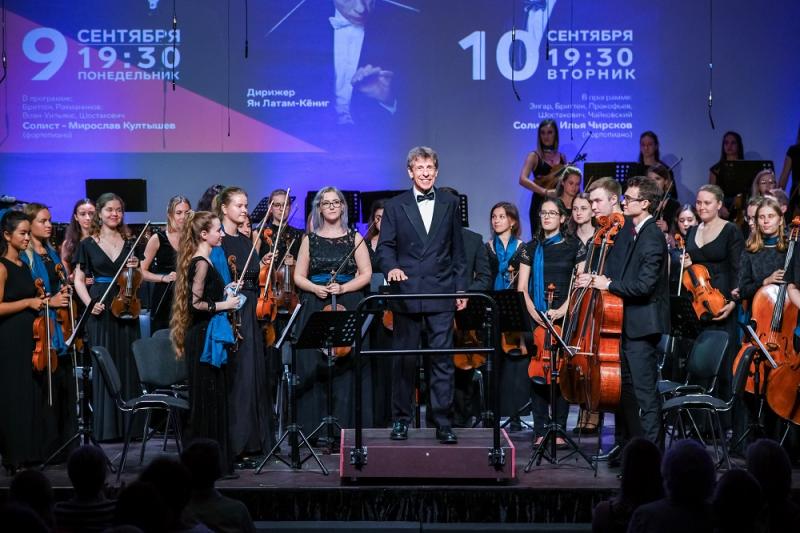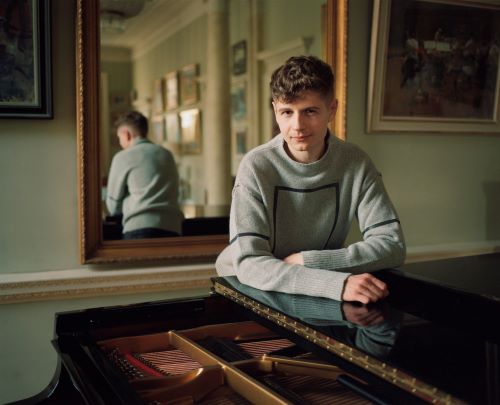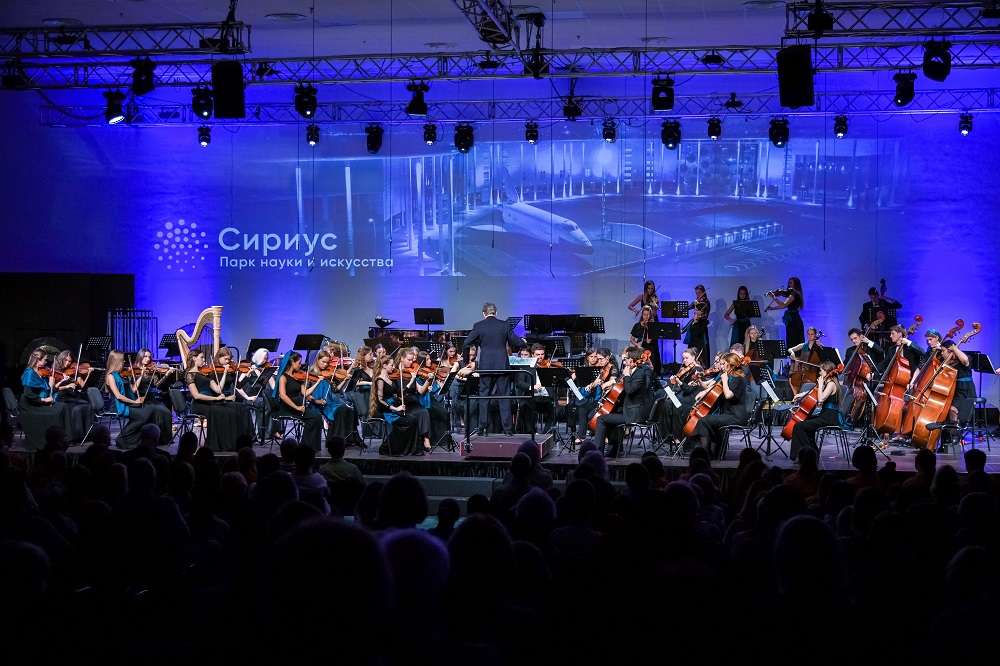Kolesnikov, Britten-Shostakovich Festival Orchestra, Latham-Koenig, Symphony Hall, Birmingham review - cross-country friendships flourish | reviews, news & interviews
Kolesnikov, Britten-Shostakovich Festival Orchestra, Latham-Koenig, Symphony Hall, Birmingham review - cross-country friendships flourish
Kolesnikov, Britten-Shostakovich Festival Orchestra, Latham-Koenig, Symphony Hall, Birmingham review - cross-country friendships flourish
New youth orchestra celebrates artistic dialogue between Russia and UK

Celebrating the friendship between the two great 20th-century composers, the Britten-Shostakovich Festival Orchestra launched this year.
87 of the finest young musicians from both countries were selected by audition, and after a week’s residency at the Sirius Park of Science and Art in Sochi, where they received coaching from a wide range of musicians drawn from major orchestras and opera houses, embarked on a tour of both countries. After a series of concerts in Sochi, Moscow and St Petersburg, the UK leg of their journey kicked off on Tuesday evening in Birmingham’s Symphony Hall.
The concert began, a little oddly, with a verse of each country’s national anthem, starting with "God Save the Queen". There may have been several British audience members who felt a little uncomfortable at being expected to be upstanding for this given our current climes though, as Britten himself said, "you should not make judgement on English people based only on the things they publish in our newspapers".
It was Britten’s music with which the programme commenced, with the Four Sea Interludes from Peter Grimes, an opera which was partly inspired by Shostakovich’s Lady Macbeth of Mtsensk. Conducted by Latham-Koenig, the violins played, perhaps not always as one voice, but certainly as a strong team, bringing out the varied hues of Britten’s angular, crossing melodies. The final "Storm" nterlude had a buzzing, frenetic energy, evoking the anger and unpredictability of the elements.

The fabulous young Russian pianist Pavel Kolesnikov (pictured above) was the soloist for Rachmaninov’s Rhapsody on a Theme of Paganini. His playing ranged from incisive to huge swirls of marbled colour. The detail at once felt expertly measured but also completely organic, his control of the piece’s rhythms uncanny. Strings again here were excellent, giving a fabulous echo to Kolesnikov’s solos.
The second half of the concert saw ferocious percussion and delicate woodwind abound in extracts from Prokofiev’s Romeo and Juliet. Latham-Koenig’s conducting here was ardent and dramatic, appearing almost as if volts of electricity were shooting through his body. Of course no programme from this orchestra would be complete without music from Shostakovich. His Suite for Variety Stage Orchestra was played with an altogether different mood from the previous Prokofiev - jaunty, jovial and spritely, with positive energy radiating from the players.
The final piece was Tchaikovsky’s 1812 Overture. The cellos’ intonation problems in the opening couple of bars gave away their lack of experience as orchestra players, though the fact they almost entirely fixed this in a remarkably short space of time showed their intelligence and understanding as musicians. The full orchestra here played with power and velocity, and there was a demostrable strong relationship between players and conductor.  The encore was almost as weirdly patriotic as the concert’s beginnings, with Latham-Koenig inviting the audience to sing along to Elgar’s "Land of Hope and Glory". No, there were no flags of any description, in case you were wondering. Music being politicised is nothing new, but the message this orchestra sends - celebrating a friendship and artistic dialogue which flourished in the face of the new cold war, and bringing a host of young people from different countries together to create a beautiful sound - is surely a good thing, and one of which we should all be proud.
The encore was almost as weirdly patriotic as the concert’s beginnings, with Latham-Koenig inviting the audience to sing along to Elgar’s "Land of Hope and Glory". No, there were no flags of any description, in case you were wondering. Music being politicised is nothing new, but the message this orchestra sends - celebrating a friendship and artistic dialogue which flourished in the face of the new cold war, and bringing a host of young people from different countries together to create a beautiful sound - is surely a good thing, and one of which we should all be proud.
- The Britten-Shostakovich Festival Orchestra's UK tour ends at Cadogan Hall on 25 September
- More classical reviews on theartsdesk
rating
Explore topics
Share this article
The future of Arts Journalism
You can stop theartsdesk.com closing!
We urgently need financing to survive. Our fundraising drive has thus far raised £49,000 but we need to reach £100,000 or we will be forced to close. Please contribute here: https://gofund.me/c3f6033d
And if you can forward this information to anyone who might assist, we’d be grateful.

Subscribe to theartsdesk.com
Thank you for continuing to read our work on theartsdesk.com. For unlimited access to every article in its entirety, including our archive of more than 15,000 pieces, we're asking for £5 per month or £40 per year. We feel it's a very good deal, and hope you do too.
To take a subscription now simply click here.
And if you're looking for that extra gift for a friend or family member, why not treat them to a theartsdesk.com gift subscription?
more Classical music
 Kempf, Brno Philharmonic, Davies, Bridgewater Hall, Manchester review - European tradition meets American jazz
Bouncing Czechs enjoy their Gershwin and Brubeck alongside Janáček and Dvořák
Kempf, Brno Philharmonic, Davies, Bridgewater Hall, Manchester review - European tradition meets American jazz
Bouncing Czechs enjoy their Gershwin and Brubeck alongside Janáček and Dvořák
 Solomon, OAE, Butt, QEH review - daft Biblical whitewashing with great choruses
Even a top soprano and mezzo can’t make this Handel paean wholly convincing
Solomon, OAE, Butt, QEH review - daft Biblical whitewashing with great choruses
Even a top soprano and mezzo can’t make this Handel paean wholly convincing
 Two-Piano Gala, Kings Place review - shining constellations
London Piano Festival curators and illustrious friends entertain and enlighten
Two-Piano Gala, Kings Place review - shining constellations
London Piano Festival curators and illustrious friends entertain and enlighten
 Echo Vocal Ensemble, Latto, Union Chapel review - eclectic choral programme garlanded with dance
Beautiful singing at the heart of an imaginative and stylistically varied concert
Echo Vocal Ensemble, Latto, Union Chapel review - eclectic choral programme garlanded with dance
Beautiful singing at the heart of an imaginative and stylistically varied concert
 Scott, Irish Baroque Orchestra, Whelan, RIAM, Dublin review - towards a Mozart masterpiece
Characteristic joy and enlightenment from this team, but a valveless horn brings problems
Scott, Irish Baroque Orchestra, Whelan, RIAM, Dublin review - towards a Mozart masterpiece
Characteristic joy and enlightenment from this team, but a valveless horn brings problems
 Classical CDs: Voice flutes, flugelhorns and froth
Baroque sonatas, English orchestral music and an emotionally-charged vocal recital
Classical CDs: Voice flutes, flugelhorns and froth
Baroque sonatas, English orchestral music and an emotionally-charged vocal recital
 Kanneh-Mason, Britten Sinfonia, Shave, Milton Court - a grin and a big beaming smile
A pair of striking contemporary pieces alongside two old favourites
Kanneh-Mason, Britten Sinfonia, Shave, Milton Court - a grin and a big beaming smile
A pair of striking contemporary pieces alongside two old favourites
 theartsdesk at the New Ross Piano Festival - Finghin Collins’ musical rainbow
From revelatory Bach played with astounding maturity by a 22 year old to four-hand jazz
theartsdesk at the New Ross Piano Festival - Finghin Collins’ musical rainbow
From revelatory Bach played with astounding maturity by a 22 year old to four-hand jazz
 First Person: Manchester Camerata's Head of Artistic Planning Clara Marshall Cawley on questioning the status quo
Five days of free events with all sorts of audiences around Manchester starts tomorrow
First Person: Manchester Camerata's Head of Artistic Planning Clara Marshall Cawley on questioning the status quo
Five days of free events with all sorts of audiences around Manchester starts tomorrow
 Goldscheider, Brother Tree Sound, Kings Place review - music of hope from a young composer
Unusual combination of horn, strings and electronics makes for some intriguing listening
Goldscheider, Brother Tree Sound, Kings Place review - music of hope from a young composer
Unusual combination of horn, strings and electronics makes for some intriguing listening

Add comment